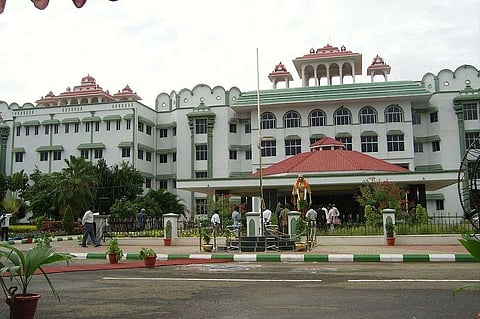

The Madurai bench of the Madras High Court on November 1 declared the Special Reservation Act, 2021, that gave 10.5% reservation to the Vanniyar Kulla caste cluster, as unconstitutional. The Act passed hastily earlier this year on February 26, by the previous AIADMK government, set aside 10.5% reservation in education and jobs to Vanniyars, who come under the Most Backward Class (MBC) category. MBCs and Denotified Communities (DNC) in Tamil Nadu get a total 20% reservation, and the February move meant that the remaining groups in the category got a total of 9.5% reservation.
In July, the Stalin-led government, months after assuming power, passed an order approving the implementation of the 10.5% reservation for Vanniyars in public and private education and in appointment to state government jobs. Further, the order was to be retrospectively implemented from February 26 — the date the Special Reservation Act was passed.
This court order from the Madurai bench follows several failed legal attempts to overturn the Act by multiple petitioners. A two-judge bench, presided by Justices Duraisamy and Murali Shankar, ruled the Act unconstitutional, asking how the percentage of 10.5% had been arrived at with no clear caste census to base the decision on. In its judgment the court said, "The impugned enactment has been passed by the State without any quantifiable data on population, educational status and representation of the backward classes in the services and the sub-classification done by virtue of the impugned Act solely based on population data, in the absence of any objective criteria, is illegal in the eye of law and in violation of the Constitution of India." In the case of reservations for Muslims and Arunthathiyars, the court pointed out that the the population figures are enumerated in every Census and based on that, the backwardness and inadequate representation has been studied.
The Special Reservation Act was introduced and passed in the Tamil Nadu Legislative Assembly by the previous AIADMK government in February. The MBC quota that the Act modified, was carved out of the Other Backward Classes (OBC) category in the 1980s. Out of the 50% that had been demarcated for OBCs, from the overall state limit of 69.5%, 20% was given to MBCs separately. The new Act enabled the ‘Vanniyakula Kshatriyas’ caste cluster to claim 10.5% from the 20% meant for MBCs.
This caste cluster comprises seven castes including Vanniyars, Gounders, Padayachi, amongst others. The Act also further divided other MBCs and Denotified Communities (DNCs) into two groups who were to compete for the 9.5% leftover in the 20%. The first, comprising 93 caste groups, would get 7% reservation and the second, comprising about 22-25 caste groups, would get 2.5%.
The Vanniyars are an MBC caste that are particularly dominant in northern Tamil Nadu. They have political clout through the Pattali Makkal Katchi (PMK), founded by S Ramadoss. The PMK, initially claiming to represent working-class (pattali makkal) interests, grew into a largely Vanniyar party.
The PMK, also an important ally in the previous AIADMK government, played a key role in the introduction of the Special Reservation Bill in February. Vanniyars have long demanded a separate quota, claiming that owing to their large population, they had been unable to compete for education or jobs within the pre-existing quota system.
After the Special Reservation Act was passed, many questioned the timing and speed with which it went through the Assembly. Tamil Nadu was due for Legislative Assembly elections. The ECI was set to announce the date of the election, and mere minutes before the announcement, the Bill was passed. Additionally, the Bill had been introduced with no clear caste census from Tamil Nadu. Though the then AIADMK government had set up a commission headed by retired High Court judge A Kulasekaran to collect caste data in December 2020, the report was yet to come in. In this regard, the 10.5% was seen as an arbitrary percentage meant purely as an electoral tactic rather than based on justifiable caste census data.
In March this year, a two-bench panel in the Madras High Court presided by Chief Justice Sanjib Banerjee and Justice Senthilkumar Ramamoorthy, had refused to stay the Act, when a petitioner had cited the above concerns saying “the court should not get involved in politics”.
With regard to the November 1 Madurai bench judgment, it was argued that out of the 93 castes that are to compete with each other for the 7% internal reservation (out of the 20% for MBCs), 68 communities are DNCs. Also 22-25 will be competing within an even smaller percentage of 2.5%.
This total is the 9.5% leftover from the 20%, if 10.5% is given to the Vanniyar Kulam cluster. The bench ruled to stay the Special Reservation Act, keeping in mind that the above numbers had been arrived at without a caste census. The bench, when asked what would happen to the seats filled until now, as the present DMK government has already been implementing the Act, reportedly replied that when the Act itself has been stayed, the same would apply to the seats filled through the Act.
Calling the Madurai bench ruling unacceptable, Ramadoss has demanded that the state government should appeal the verdict, urging the Chief Minister to do his “duty and responsibility” towards reinstating the internal reservation. He reportedly added that neither the Supreme Court nor High Court had questioned “similar reservations for Muslims or Arundhathiyars” in Tamil Nadu.
Advocate General Shanmugasundaram has said that the state government will appeal the order in the Supreme Court.